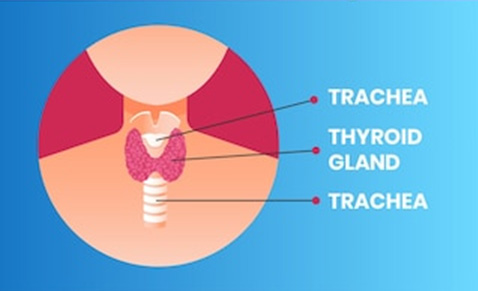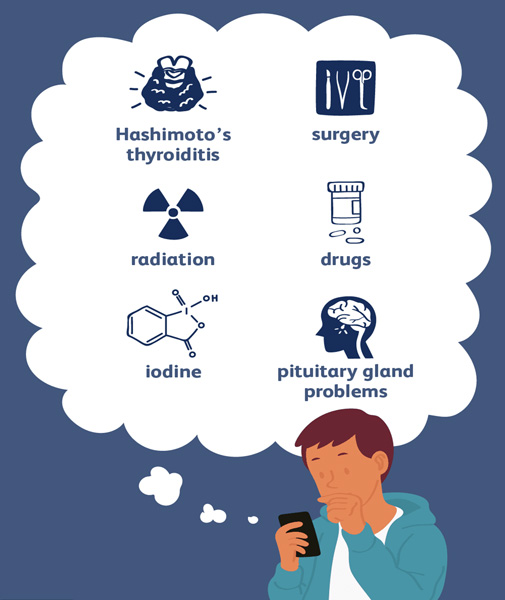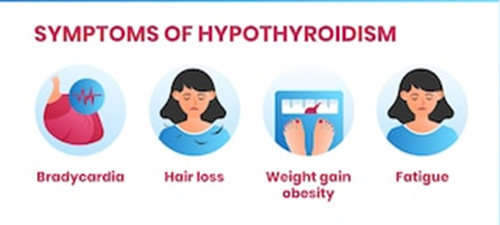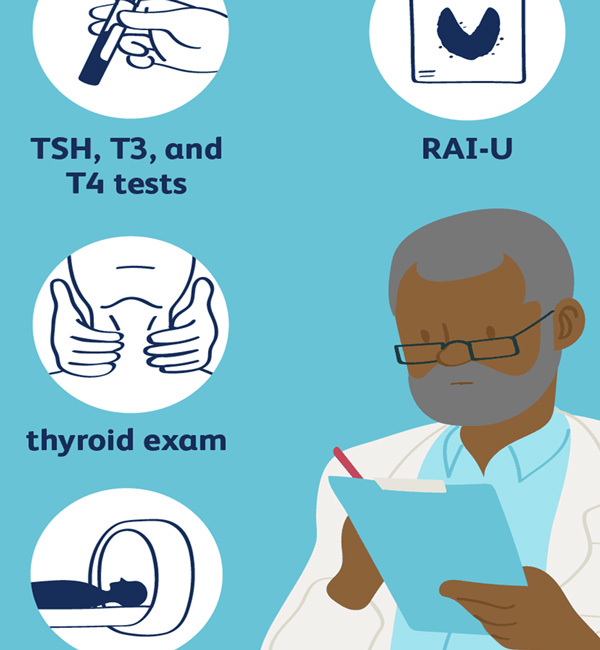Introduction
Hypothyroidism is a condition where there isn’t enough thyroid hormone in your bloodstream and your metabolism slows down. Hypothyroidism happens when your thyroid doesn’t create and release enough thyroid hormone into your body. This makes your metabolism slow down, affecting your entire body. Also known as underactive thyroid disease, hypothyroidism is fairly common.
Understanding Hypothyroidism
Hypothyroidism is a condition characterised by an underactive thyroid gland, which leads to insufficient production of thyroid hormones. These hormones play a crucial role in regulating metabolism, energy levels, and various bodily functions. When thyroid hormone levels are low, it can result in a wide range of symptoms and impact overall health.

Causes of Hypothyroidism
Hypothyroidism results when the thyroid gland fails to produce enough hormones. Hypothyroidism may be due to a number of factors, including :
- Autoimmune disease
The most common cause of hypothyroidism is an autoimmune disorder known as Hashimoto's thyroiditis. Autoimmune disorders occur when your immune system produces antibodies that attack your own tissues. Sometimes this process involves your thyroid gland.
- Thyroid Surgery
Removing all or a large portion of your thyroid gland can diminish or halt hormone production. In that case, you'll need to take thyroid hormone for life.
- Radiation Therapy
Radiation used to treat cancers of the head and neck can affect your thyroid gland and may lead to hypothyroidism.
- Medications
A number of medications can contribute to hypothyroidism. One such medication is lithium, which is used to treat certain psychiatric disorders. If you're taking medication, ask your doctor about its effect on your thyroid gland.
Less often, hypothyroidism may result from one of the following:
- Congenital Disease
Some babies are born with a defective thyroid gland or no thyroid gland. In most cases, the thyroid gland didn't develop normally for unknown reasons, but some children have an inherited form of the disorder. Often, infants with congenital hypothyroidism appear normal at birth. That's one reason why most states now require newborn thyroid screening.
- Pituitary Disorder
A relatively rare cause of hypothyroidism is the failure of the pituitary gland to produce enough thyroid-stimulating hormone (TSH) — usually because of a benign tumour of the pituitary gland.
- Pregnancy
Some women develop hypothyroidism during or after pregnancy (postpartum hypothyroidism), often because they produce antibodies to their own thyroid gland. Left untreated, hypothyroidism increases the risk of miscarriage, premature delivery and preeclampsia — a condition that causes a significant rise in a woman's blood pressure during the last three months of pregnancy. It can also seriously affect the developing foetus.
- Iodine Deficiency
The trace mineral iodine — found primarily in seafood, seaweed, plants grown in iodine-rich soil and iodized salt — is essential for the production of thyroid hormones. Too little iodine can lead to hypothyroidism, and too much iodine can worsen hypothyroidism in people who already have the condition. In some parts of the world, iodine deficiency is common, but the addition of iodine to table salt has virtually eliminated this problem in the United States.

Symptoms of Hypothyroidism
Symptoms of hypothyroidism commonly include, but are not limited to:
- fatigue
- weight gain
- cold intolerance
- slowed heart rate, movements, and speech
- joint and muscle pain, cramps, and weakness
- constipation
- dry skin
- thin, brittle hair or fingernails
- decreased sweating
- pins and needles
- heavy periods, or menorrhagia
- weakness
- high cholesterol
- puffy face, feet, and hands
- insomnia
- balance and coordination issues
- loss of libido
- recurrent urinary and respiratory tract infections
- anaemia
- Depression

Risk Factors
Although anyone can develop hypothyroidism, they're at an increased risk if :
- Are a woman
- Are older than 60
- Have a family history of thyroid disease
- Have an autoimmune disease, such as type 1 diabetes or celiac disease
- Have been treated with radioactive iodine or anti-thyroid medications
- Received radiation to neck or upper chest
- Have had thyroid surgery (partial thyroidectomy)
- Have been pregnant or delivered a baby within the past six months
Complication
Untreated hypothyroidism can lead to a number of health problems :
- Goitre
Constant stimulation of your thyroid to release more hormones may cause the gland to become larger — a condition known as a goitre. Although generally not uncomfortable, a large goitre can affect your appearance and may interfere with swallowing or breathing.
- Heart Problems
Hypothyroidism may also be associated with an increased risk of heart disease and heart failure, primarily because high levels of low-density lipoprotein (LDL) cholesterol — the "bad" cholesterol — can occur in people with an underactive thyroid.
- Mental Health Issues
Depression may occur early in hypothyroidism and may become more severe over time. Hypothyroidism can also cause slowed mental functioning.
- Peripheral Neuropathy
Long-term uncontrolled hypothyroidism can cause damage to your peripheral nerves. These are the nerves that carry information from your brain and spinal cord to the rest of your body — for example, your arms and legs. Peripheral neuropathy may cause pain, numbness and tingling in affected areas.
- Myxedema
This rare, life-threatening condition is the result of long-term, undiagnosed hypothyroidism. Its signs and symptoms include intense cold intolerance and drowsiness followed by profound lethargy and unconsciousness.
A myxedema coma may be triggered by sedatives, infection or other stress on your body. If you have signs or symptoms of myxedema, you need immediate emergency medical treatment.
- Infertility
Low levels of thyroid hormone can interfere with ovulation, which impairs fertility. In addition, some of the causes of hypothyroidism — such as autoimmune disorder — can also impair fertility
- Birth Defects
Babies born to women with untreated thyroid disease may have a higher risk of birth defects compared to babies born to healthy mothers. These children are also more prone to serious intellectual and developmental problems.
- Infants with untreated Hypothyroidism
They present at birth are at risk of serious problems with both physical and mental development. But if this condition is diagnosed within the first few months of life, the chances of normal development are excellent.
Diagnosis
In general, doctors may test for an underactive thyroid if they are feeling increasingly tired, have dry skin, constipation and weight gain, or have had previous thyroid problems or a goitre.
- Blood Tests
Diagnosis of hypothyroidism is based on symptoms and the results of blood tests that measure the level of TSH and sometimes the level of the thyroid hormone thyroxine.
A low level of thyroxine and high level of TSH indicate an underactive thyroid. That's because the pituitary produces more TSH in an effort to stimulate thyroid gland into producing more thyroid hormone.
Doctors can diagnose thyroid disorders much earlier than in the past — often before experiencing symptoms. Because the TSH test is the best screening test, doctors will likely check TSH first and follow with a thyroid hormone test if needed.
TSH tests also play an important role in managing hypothyroidism. They help doctors determine the right dosage of medication, both initially and over time.
In addition, TSH tests are used to help diagnose a condition called subclinical hypothyroidism, which usually causes no outward signs or symptoms. In this condition, they have normal blood levels of triiodothyronine and thyroxine, but higher than normal levels of TSH.
There are certain factors that can affect blood tests for thyroid problems. One is the blood-thinning medication called heparin. Another is biotin, a vitamin taken as a stand-alone supplement or as part of a multivitamin. Let your doctor know about any medications or supplements you take before having blood tests done.

Homeopathy and Hypothyroidism
Homoeopathy offers a holistic approach to managing hypothyroidism by addressing the underlying causes, stimulating the body's self-healing mechanisms, and promoting natural balance. Homoeopathic remedies are selected based on an individual's specific symptoms, overall health, and constitutional factors. The goal of homoeopathy is to restore optimal thyroid function, alleviate symptoms, and improve overall well-being.
Homoeopathic Medicines for Hypothyroidism
- Sepia Officinalis
- Weak, slightly yellow appearance
- A tendency to faint, especially when in cold temperatures
- Extreme intolerance to cold, even in warm surroundings
- Increased irritability
- Hair loss
- Increased menstrual flow that occurs ahead of schedule
- Constipation
- Increased desire for pickles and acidic foodstuff
- Calcarea Carbonica
- Fat, flabby, fair person
- Increased intolerance to cold
- Excessive sweating, especially in the head
- Aversion to fatty foods
- Peculiar food habits including a craving for eggs, chalk, pencils, lime,
- Increased menstruation that is also prolonged and is associated with feet turning cold
- Lycopodium Clavatum
- Physically weakened
- Increased irritability
- Excessive hair fall
- The face is pale yellow with blue circles around the eyes
- Craving for foods that are hot and sweet
- Acidity that is worse in the evenings
- Gastric issues including excessive flatulence
- Constipation with painful, hard, incomplete stooling
- Graphites
- Obesity
- Intolerance to cold
- Depressed emotionally, timid, indecisive, weeping, listening to music
- Bloated, gassy abdomen
- Chronic constipation with hard, painful stooling process
- Iodum
- Good appetite but lose weight quickly
- Tendency to eat at regular intervals
- Excessive warmth and need to stay in a cool environment
Benefits of Homoeopathic Treatment
- Individualised Care: Homoeopathy recognizes that each person's experience with hypothyroidism is unique. A homoeopath will assess the symptoms, medical history, and individual characteristics to prescribe a personalised treatment plan tailored to the individual's needs.
- Gentle and Natural: Homoeopathic remedies are derived from natural substances and are known for their safety and minimal side effects. They work in harmony with the body, promoting self-healing and restoring natural balance.
- Holistic Approach: Homoeopathy considers not only the physical symptoms but also the emotional and mental aspects of an individual. It aims to restore balance at all levels, providing comprehensive care.
- Improved Thyroid Function: By addressing the underlying causes of hypothyroidism and promoting optimal thyroid function, homoeopathy strives to alleviate symptoms, enhance energy levels, regulate metabolism, and improve overall well-being.
Patient Review
Consulting a Homeopath
If you are seeking homoeopathic treatment for hypothyroidism, it is essential to consult with a qualified and experienced homoeopath. At Sanjivani Homeopathy Clinic, our team of skilled homoeopaths will conduct a thorough evaluation, considering your symptoms, medical history, and individual characteristics to develop a personalised treatment plan.
Sanjivani Homeopathy Clinic USP
- No homoeopathy Dietary Restrictions:
Allows patients to enjoy foods like onion, garlic, and coffee, ensuring a stress-free treatment journey.
- 24/7 Online Consultations:
Enables convenient access to doctors with detailed counseling, history management, and follow-ups.
- Highly Skilled Team:
Experienced BHMS and MD doctors, supported by multilingual and professional staff.
- Patient-Centric Care:
Simplifies treatment with modern, adaptable solutions and clear communication.
Click Here for Detailed "Sanjivani USP"
FAQ's
- What is homoeopathy ?
Homoeopathy is a holistic science which belives in the law of Similia Similibus Curenter i.e Like Cures Like .It was discovered by Dr Samuel Christian Hahnemannn in 1796.
- Is there any side effects of homoeopathy?
As homoeopathic medicines are made from natural substances this medicines have no side effects and are completely safe to consume
- Is there any diet restriction to take homoeopathic medicines?
There are no diet restrictions for homoeopathic medicines. One should only avoid eating or drinking any liquid other than water at least 30 minutes before and after taking homoeopathic medicines.
Click Here for "Frequently Asked Questions."
Conclusion
Hypothyroidism can have a significant impact on overall health and well-being, but with the holistic approach of homoeopathy, there is hope for natural balance and improved thyroid function. Sanjivani Homeopathy Clinic is dedicated to providing personalised and effective treatments for hypothyroidism. Contact us today to embark on a journey toward managing your symptoms and enhancing your overall well-being.
Disclaimer : The information provided in this blog is for educational purposes only and should not be considered medical advice. Please consult with a qualified healthcare professional before starting any treatment for Hypothyroidism or any other medical condition.


